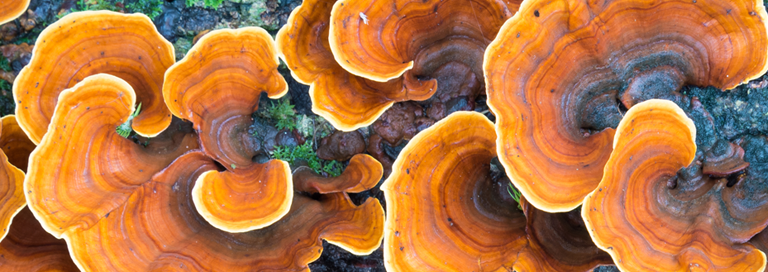The biotech world is abuzz these days over proposed drugs to help you live longer.
It sounds great… except for the drug part.
After circumnavigating the globe seeking ancient natural cures, I’ve developed several ways to prolong your “health span”… the amount of time you can live a long, rich life free from chronic disease.
And you don’t have to become a guinea pig for Big Pharma’s experimental drugs either.
Increasingly, there’s a natural “longevity superfood” in the spotlight. People call it a plant but it’s really a fungus.
I’m talking about health-boosting, medicinal mushrooms.
Only when you assemble all the pieces of the mushroom longevity puzzle can you see the complete picture. And it’s stunning….
Live Long and Prosper
With Medicinal Mushrooms
Researchers are finally waking up to something I’ve been talking about for years — the far-reaching longevity benefits of mushrooms, including:
Brain health – One study of 663 subjects in Singapore compared mushroom intake with the risk of developing cognitive impairment.
Participants consuming mushrooms three or more times a week were 43% less likely to develop dementia.1 That’s because mushrooms are neurotropic, promoting the health of neurons.2
Inflammation – As my regular readers know, inflammation is an express train ride to accelerated aging. Mushrooms are packed with powerful anti-inflammatory compounds, including polysaccharides, phenolic and indolic compounds, mycosteroids, fatty acids, and carotenoids.3 They help you tamp down inflammation before it can spiral out of control.
Anti-Mutagenic – Their cancer-fighting properties are legendary. My regular readers know I’m quite impressed with the cordyceps sinensis variety445445 in this regard. It’s shown a powerful ability to inhibit cancer growth in lung, colon, skin, and liver cells.4 One recent study found that eating just a tablespoon and a half of mushrooms led to a 45% reduction in cancer risk.5 That’s quite significant
considering 4 in every 10 Americans develop cancer at some point during their lives.6Mitochondria – Each cell in your body relies on minuscule power plants to provide energy called mitochondria. As you age, their production declines due to oxidative damage. Mushrooms provide the No. 1 most concentrated food source of a unique amino acid that functions as an antioxidant. Called ergothioneine, it scavenges free radicals with a vengeance to boost your mitochondrial energy production.7
Mushrooms are also impressive immune boosters… the only “vegetable” that contains vitamin D. No wonder they’re on the menu of anyone serious about keeping their golden years free of chronic disease.
The only question is how best to get them, and that can be a bit tricky. Here’s why…
An Ounce of Mushrooms Worth a Pound of Cure
The surfaces of mushrooms are quite porous. They readily absorb any pollutants they’re exposed to during processing. So if it’s an extract, capsule, or powder, you have to be careful.
My recommendation: Stay safe by making your own supply. It’s surprisingly easy, and my simple drying method boosts levels of vitamin D and other nutrients:
-
- First, find a reliable, local source of fresh mushrooms – shiitake, reishi, maitake, lion’s mane, and oyster are all good varieties. I buy from my local produce stand.
-
- Just spread the mushrooms out in the sun on some parchment paper or flat pieces of wood (I don’t recommend aluminum trays). Let them sit in the sun.
-
- Before nightfall, cover them. This prevents getting dew on them.
-
- Re-expose them to sun, and repeat the drying process the next day. You can also put them in a food dehydrator to ensure they’re thoroughly dried.
-
- Once they’re a bit crispy, use a blender or food processor to make your powder. You may need a fine mesh strainer to collect leftover chunks. Just give them a second run through your processor.
-
- Store your powder in an air-tight glass container. Keep it away from heat and light.
Once a day, just toss a couple tablespoons in your coffee, smoothie, soups, or yogurt. Properly dried mushrooms will last for up to a year.
So enjoy the taste, the convenience… and the longevity benefits.
To Your Good Health,
![]()
Al Sears, MD, CNS
References:
1 Feng, Lei, et al. “The Association between Mushroom Consumption and Mild Cognitive Impairment: A Community-Based Cross-Sectional Study in Singapore.” Journal of Alzheimer’s Disease, vol. 68, no. 1, 12 Mar. 2019, pp. 197–203, 10.3233/jad-180959. Accessed 18 Sept. 2020.
2 Sabaratnam, Vikineswary, et al. “Neuronal Health – Can Culinary and Medicinal Mushrooms Help?” Journal of Traditional and Complementary Medicine, vol. 3, no. 1, Jan. 2013, pp. 62–68.
3 Muszyńska, Bożena, et al. “Anti-Inflammatory Properties of Edible Mushrooms: A Review.” Food Chemistry, vol. 243, Mar. 2018, pp. 373–381, 10.1016/j.foodchem.2017.09.149.
4 Van De Walle, Gavin. “6 Benefits of Cordyceps, All Backed by Science.” Healthline.com website, 9 May 2018.
5 Ba, Djibril, et al. “Higher Mushroom Consumption Is Associated with a Lower Risk of Cancer.” ScienceDaily.com website, 16 Mar. 2021, 33.htm.
6 National Cancer Institute. “Cancer Statistics.” National Cancer Institute, Cancer.gov, 2020.
7 Geng, Ping, et al. “Antifatigue Functions and Mechanisms of Edible and Medicinal Mushrooms.” BioMed Research International, 14 Aug. 2017, Accessed 18 Aug. 2021

